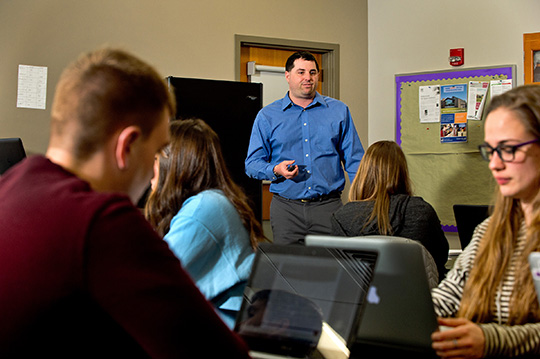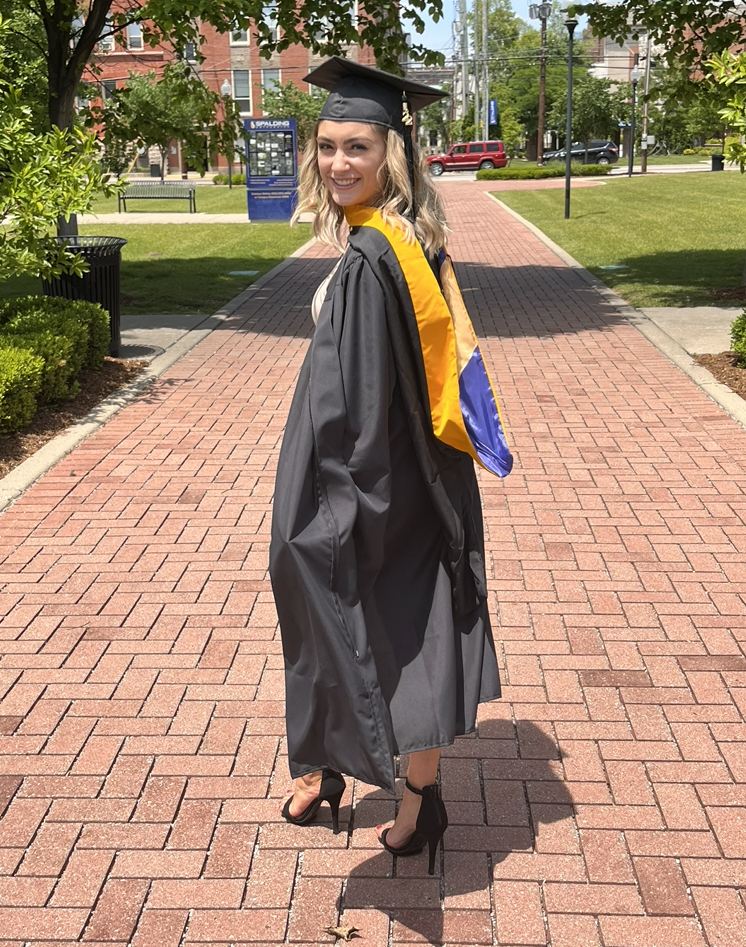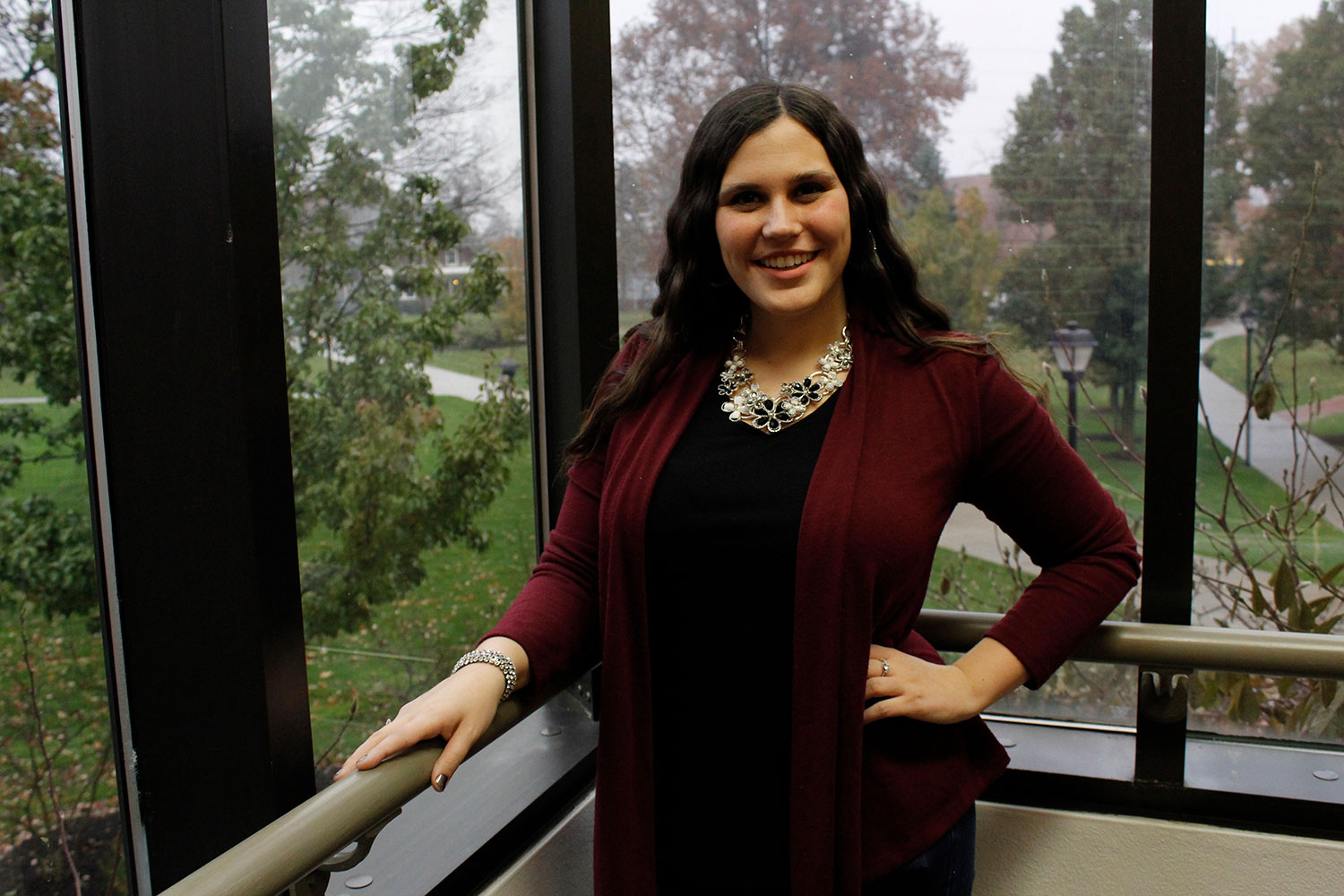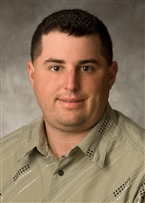Bachelor of Science in Neuroscience
The Bachelor of Science degree in neuroscience at the University of Mount Union allows students to explore the impact that the brain has on behavior and mental processes through a number of courses and hands-on experiences with peers and faculty. Students will learn about the physiology of the brain, its impact on behaviors and psychiatric disorders, as well as basic chemistry and biology skills needed to understand neuroscience. The major itself focuses as well on clinical and health outcomes of brain science.
Neuroscience Major Quick Facts
The neuroscience degree at the University of Mount Union requires a total of 44 major-specific credit hours, as well as 32 credits to fulfill the Integrative Core. The Integrative Core is the University’s general education program and gives students the opportunity to explore areas of interest outside of their field of study as well as give the necessary leadership and communication skills needed for a rewarding career.
Neuroscience is a major that allows students to explore their work in ways in which they gain hands-on experience outside of the classroom, such as:
- Psychophysiological and neuropsychological research in an undergraduate laboratory
- Canine cognition opportunities for students interested in animal research
- AA project within the drugs and behavior course
- Build your own illusion project in the sensation and perception course
- Hands-on laboratory days in the core neuroscience courses
- Internship opportunities working with Autism in Spectrum Education Center
-
Learning Objectives
Learning ObjectivesWith a broad-base of knowledge regarding behavior and mental processes, a major in neuroscience at the University of Mount Union will prepare you for advanced study in graduate and professional schools in several different areas including:
- Core work in neuroscience anatomy and physiology
- Basic science research in courses such as Sensation and Perception and Cultural Health Psychology
- Applied science research in courses such as Introduction to Autism and Drugs and Behavior
The neuroscience major provides many opportunities for experiential learning through internships and field placements and a robust undergraduate research laboratory setup across multiple faculty members.
Departmental Mission
The mission of the Department of Psychology, Neuroscience, and Human Development is to develop and maintain an academic curriculum and co-curricular activities that help students acquire a broad base of knowledge in the field, acquire the intellectual and communication skills necessary to participate in these fields as scientists and practitioners, and develop characteristics that encourage personal fulfillment, meaningful work and responsible citizenship.
Department Goals
Knowledge Base- The Department of Psychology, Neuroscience, and Human Development provides courses, programs, and experiences that foster the acquisition of fundamental knowledge and comprehension of the major concepts, theoretical perspectives, historical trends, and empirical findings to discuss how psychological principles apply to behavioral problems. Students completing foundation courses should demonstrate breadth of their knowledge and application of psychological ideas to simple problems; students completing a baccalaureate degree should show depth in their knowledge and application of psychological concepts and frameworks to problems of greater complexity.
Scientific Inquiry and Critical Thinking- The Department of Psychology, Neuroscience, and Human Development provides courses, programs, and experiences that enable students to develop the skills in this domain that involve the development of scientific reasoning and problem solving, including effective research methods. Students completing foundation-level courses should learn basic skills and concepts in interpreting behavior, studying research, and applying research design principles to drawing conclusions about psychological phenomena; students completing a baccalaureate degree should focus on theory use as well as designing and executing research plans.
Ethical and Social Responsibility in a Diverse World- The Department of Psychology, Neuroscience, and Human Development provides courses, programs, and experiences that enable students to develop the skills in this domain including the development of ethically and socially responsible behaviors for professional and personal settings in a landscape that involves increasing diversity. Students completing foundation-level courses should become familiar with the formal regulations that govern professional ethics in psychology and begin to embrace the values that will contribute to positive outcomes in work settings and in building a society responsive to multicultural and global concerns. Students completing a baccalaureate degree should have more direct opportunities to demonstrate adherence to professional values that will help them optimize their contributions and work effectively, even with those who do not share their heritage and traditions. This learning goal also promotes the adoption of personal and professional values that can strengthen community relationships and contributions.
Communication- The Department of Psychology, Neuroscience, and Human Development provides courses, programs, and experiences that foster the acquisition of competence in writing and in oral and interpersonal communication skills. Students completing foundation-level courses should write a cogent scientific argument, present information using a scientific approach, engage in discussion of psychological concepts, explain the ideas of others, and express their own ideas with clarity. Students completing a baccalaureate degree should produce a research study or other psychological project, explain scientific results, and present information to a professional audience. They should also develop flexible interpersonal approaches that optimize information exchange and relationship development.
Professional Development- The Department of Psychology, Neuroscience, and Human Development provides courses, programs, and experiences that emphasize an application of psychology-specific content and skills, effective self-reflection, project-management skills, teamwork skills, and career preparation. Foundation-level outcomes concentrate on the development of work habits and ethics to succeed in academic settings. The skills in this goal at the baccalaureate level refer to abilities that sharpen student readiness for postbaccalaureate employment, graduate school, or professional school. These skills can be developed and refined both in traditional academic settings and in extracurricular involvement. In addition, career professionals can be enlisted to support occupational planning and pursuit.
-
Experiential Learning
Experiential LearningStudents who choose to major in neuroscience at the University of Mount Union have ample opportunities to get “real-world” experience outside of the classroom. By getting involved in extracurricular opportunities and student organizations, you can strengthen your skills and knowledge in behavioral and cognitive neuroscience, both of which are critical to career success.
Student Organizations
Psychology Club is a student-led organization on Mount Union’s campus, and it’s a fun and interesting way for students and faculty to interact outside of the classroom. By getting involved in the Psychology Club, you’ll have the opportunity to hear presentations from professionals in the field, discuss graduate school and jobs as well as attend social activities. The club also sponsors informational trips to local facilities and service agencies. It is open to all students regardless of major and its purpose is to encourage and promote the study of psychological science while stimulating interest in professional aspects of the field.
Psi Chi is a national psychology honor society. The activities of Mount Union’s local chapter are varied, although many are designed to stimulate professional growth by creating a fellowship with other psychology professionals across the nation. The chapter provides opportunities to promote individual research involvement and to reward achievement of professional leadership qualities. There are many advantages of membership including:
- honor and recognition for academic excellence
- access to colleagues and experienced psychologists
- opportunities to develop leadership skills
- opportunities to develop relationships with faculty and other psychology professionals
- ability to socialize with other psychology students
- access to educational and career-building programs and events
- opportunities to serve the campus and the wider community
Research
Conducting psychological, neuroscience, and human development research provides students with an opportunity to explore a new area of study, contribute new findings to the field and/or expand upon current discoveries. Students pursuing a neuroscience degree or a neuroscience minor have the following research opportunities available at Mount Union:
- Research-based sophomore and junior courses
- Undergraduate research laboratory work under the guidance of a faculty member
- Individual honors projects
- A collaborative senior research project
Students in our department have worked in the canine cognition lab, humor lab, and psychophysiological and neuropsychology laboratory. Students have taken part in conference presentations at the annual conferences of the Midwestern Psychological Association, Eastern Psychological Association, International Neuropsychological Society, and Association for Psychological Science. A sample of journals that student authors have published in along with a faculty mentor include: Journal of the International Neuropsychological Society, Perceptual and Motor Skills, and Laterality.
Within the senior research course, neuroscience majors who pursue research opportunities will be able to analyze and investigate areas in which they are most interested. Throughout the structured research process, students will critically evaluate neuroscience research by conducting a literature review, developing a research proposal, designing and conducting neuroscience research, analyzing statistical data and communicating findings effectively with the scientific community and the general public. Exemplary research projects and results will be presented at Mount Union’s annual SCHOLAR Day.
-
Careers and Internships
Careers and InternshipsCareers
Neuroscientists study the brain and its functions including memory, perception, action, language and conscious awareness, according to the Psychology Career Center. A relatively new field stemming back to the 1950s when early theories regarding brain functioning began to emerge, innovation in neuroscience was fueled by advancements in molecular biology.
This discipline truly began to take form when methods for analyzing behavioral-cognitive relationships were developed and combined with cellular neurobiological research. Today, neuroscience connects cognitive-behavioral outcomes with underlying neural systems.
With a solid foundation in the study of behavior and mental processes, our major in neuroscience will help you develop the practical skills needed to succeed through hands-on projects and research. A core curriculum is combined with the ability to tailor the major requirements to suit your individual needs to prepare you for future success.
Most career positions in neuroscience are research-oriented, and typically require a Ph.D. Our major integrates courses from several disciplines, preparing you for advanced study in graduate and professional schools and/or entry-level positions, all in pursuit of a rewarding future.
Recent Employers
Step By Step Academy
Cleveland Clinic Center for Autism
ReMed
Lincoln Memorial University
Nationwide Children's Hospital
Recent Grad Schools
Cleveland State University
Wright State University
Lehigh University
Kent State University
University of Toledo
Common Careers
Health/social research
Clinical psychology
Psychiatry
Neurology
Fields of medicine
Internships
Internships for neuroscience majors are optional but do provide students with valuable clinical experience to help boost job prospects and graduate and professional school applications. These internships allow neuroscience students go out into the workforce and gain practical experience, which is critical to finding a job after graduation. These experiences provide an opportunity to gain practical knowledge in certain areas of concentration while allowing students to apply textbook information into the work place.
While attending the University of Mount Union, neuroscience students may take internships ranging from 4-16 total credits. Students who choose to participate in an internship will have the opportunity to work with an employer from range of organizations in the following areas:
- Group homes
- Child and adolescent service centers
- Drug abuse counseling agencies
- Crisis intervention agencies
- Counseling services in the schools
- Probation offices
- Mental retardation agencies
- Mental health facilities
- Other social service organizations
Some Sample Internship Locations:
- Alliance City Schools
- Alliance Community Hospital
- Alliance Domestic Violence Shelter
- Alliance Pregnancy Center
- Copeland Oaks Retirement Community
- Mount Union’s Office of Alcohol, Drug and Wellness Education
- Pegasus Farms
- The Stuckey Family Interfaith Child Development Center
- Villa Maria Assisted Living
With the department, neuroscience students in particular have been interested the full semester intern positions with the Spectrum Education Center.









